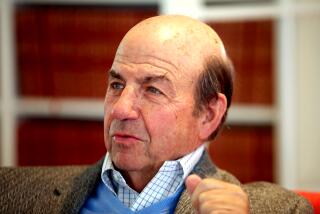All the fish story that’s fit to print
- Share via
KEVIN O’HIGGINS was the “hard man” in the Irish Free State’s early governments. He was determined to reshape his country, but the absolute certainty of his own judgments and the utter implacability of his antagonisms were among the things that lent Ireland’s civil war its wantonly brutish character.
Ten years after O’Higgins was himself gunned down on his way to Mass, Yeats happened on his portrait during that famous last visit to Dublin’s National Gallery and mused that his countenance wore
A gentle questioning look that
cannot hide
A soul incapable of remorse or
rest....
Something similar occurs to a reader of Howell Raines’ new book, “The One That Got Away: A Memoir,” not only because the author has a fondness for quoting Yeats, but also because this is another example of how the autobiography is most revealing when it is inadvertently so.
Raines is the former executive editor of the New York Times, whose ill-considered -- somewhat amorphous -- effort to revolutionize the paper into something with a “higher metabolism” came to grief on the shoals of the Jayson Blair scandal. In its aftermath, Raines lost the support of his staff, the confidence of his publisher, Arthur Sulzberger Jr., and his job. The revolution had devoured its leader less than two years into the struggle.
In the time since, Raines has published some first-rate political journalism and a long magazine article on what went wrong. If you’ve read that, you’ve pretty well heard his case, so you may not mind that this book is mainly about fishing. Or rather, it’s about how fishing prepared Raines for a loss too painful to confront directly -- far better to trick it up in a lot of Brer Rabbit-meets-Izaak Walton ruminations instead. Raines, as he endlessly reminds his readers, is a Southerner.
It’s when this self-described “mean-spirited liberal” turns to newspapers that you begin to get the glimmer of what went so terribly wrong there on 43rd Street. As it turns out, Raines never really wanted the job. He wanted to write great books, but he stayed in journalism for the money -- and the chance to show everybody else how smart he was.
“Helping the paper make the changes necessary to assuring its own future was a worthy life’s work,” he writes. “I was curious to see just how good the Times could be if energy and creativity could be wedded to its ideals and superior resources.”
Of course, and why hadn’t anybody else ever thought of that?
The beneficiary of Raines’ generosity -- and this is the only flash of that quality in the book -- was to be Sulzberger, though the editor is at pains to point out that the publisher inherited his job rather than obtaining it through merit, as the guy from Alabama did.
Sulzberger’s father, Punch, once invited Raines to his fishing camp in Canada and is rewarded in this book with the following description of his character: “He knew who he was, a personable guy who had been lucky enough to inherit a newspaper and then to outlive all the family competitors for the top job. It is no accident that Punch and Katharine Graham of the Washington Post were great friends. They were siblings under the skin in that neither could imagine a world in which sons and daughters of the manor did not rise.”
Clearly, Raines has no such difficulty, but it is hard to determine whether the point of origin for this is the mind or the spleen. That’s the problem, of course, with mean-spirited anything. There’s something slightly alarming about a man of this age and experience carrying around this sort of class resentment like Alabama clay on his boots.
Still, Punch Sulzberger and Graham, like the late Otis Chandler, were visionary publishers who had the insight to pick great editors to help them reshape American newspaper journalism. That’s a fact gleaned from history rather than fishing and, as a failed newspaper editor, Raines might be expected to approach it with a dash of humility.
It seems, however, that isn’t one of the virtues imparted by time spent with rod and reel. Thus, three-quarters of the way through his book, Raines denounces what he calls “the core delusion of newspaper owners and workers,” the belief that they’re writing and editing for a “mass” audience. In place of this fantasy, Raines proposes pitching newspapers to smaller, better-educated, more affluent readers whose attractiveness to advertisers will produce ever-increasing revenues with which to finance quality journalism. It’s a great plan; in fact, it worked awfully well for Sulzberger, Graham and Chandler, when they began redirecting their respective newspapers along those very lines -- 40 years ago. The current insufficiency of that business model is one of the sources of newspaper journalism’s current crisis.
Raines must have been salmon fishing when that dawned on the rest of his colleagues.
Of all the author’s “smash mouthed” antagonisms, none does him less credit than his obvious animosity toward his predecessor -- and successor -- Joe Lelyveld, who was prematurely nudged aside by Arthur Sulzberger Jr. to clear the way for Raines’ anticipated revolution. How deep is this animosity? Well, bad enough that Raines never mentions the former executive editor’s name. This is Raines’ description of the moment when he became editorial page editor with Lelyveld in the top job:
“The new executive editor was an intensely traditional Timesman who would keep the news sections on automatic pilot. That meant that if the paper was to have a pulse during the late ‘90s, it would have to come from the editorial pages, and we were open for business.”
Lelyveld was a great correspondent who became one of the finest newspaper editors of his generation. He built the New York Times staff that responded so magnificently to the newly installed Raines’ direction on Sept. 11, winning more Pulitzer Prizes than any paper before or since. Pushed into premature retirement by an insufficiently appreciative publisher, Lelyveld nonetheless returned to the Times to pick up the pieces after Raines’ fumble of the Blair fiasco resulted in an institutional implosion. The contrast between this book and Lelyveld’s recently published familial memoir is instructive: Lelyveld has passion; Raines enthusiasm. Lelyveld writes eloquently; Raines engagingly. Lelyveld is reflective; Raines is quick.
You may prefer one style to the other -- or think it better suited to a particular moment -- but it is a distinction with a difference.
For all his self-conscious, country gentleman archaisms and antebellum tics, Raines is a great storyteller from a culture of great storytellers. Heirs to such a tradition live with a particular temptation -- the notion that some larger truth resides in the artful arrangement of some of the facts. It’s a style that glosses over contradiction and necessarily omits the prickly or inconvenient details of which reality -- and a real life -- are composed.
It’s a style that puts a premium on that deadliest of qualities -- charm. Thus life is ... a fishing trip, or gardening, or mountain climbing, or bowling. Take your pick. Years ago, in fact, another Timesman from another storytelling tradition told me this one:
A great Hasidic rabbi lay on his deathbed and his followers drew near, hoping to catch a last word from the saintly man. They filled his bedchamber and his house and spilled out onto the street. Finally, one of the impatient young men at the back of the crowd said, “Ask the rebbe, ‘What is the meaning of life?’ ”
The question was murmured from man to man, until finally one of the elders at the bedside leaned over and asked: “Rebbe, what is the meaning of life?” He responded, “Life is a fountain.”
Back through the crowd went the whispered response: “Life is a fountain. The rebbe says, ‘Life is a fountain.’ ” But when it reached the young man, he said, “What does he mean, ‘Life is a fountain?’ ”
Back through the crowd went the new question, and one of the elders beside the dying man whispered in his ear, “Rebbe, what do you mean, ‘Life is a fountain’?” The saint shrugged against his pillow and replied, “OK, so life isn’t a fountain.”
It isn’t fishing either, which may be why the phrase “fish story” has the connotation it does.
More to Read
Sign up for our Book Club newsletter
Get the latest news, events and more from the Los Angeles Times Book Club, and help us get L.A. reading and talking.
You may occasionally receive promotional content from the Los Angeles Times.







